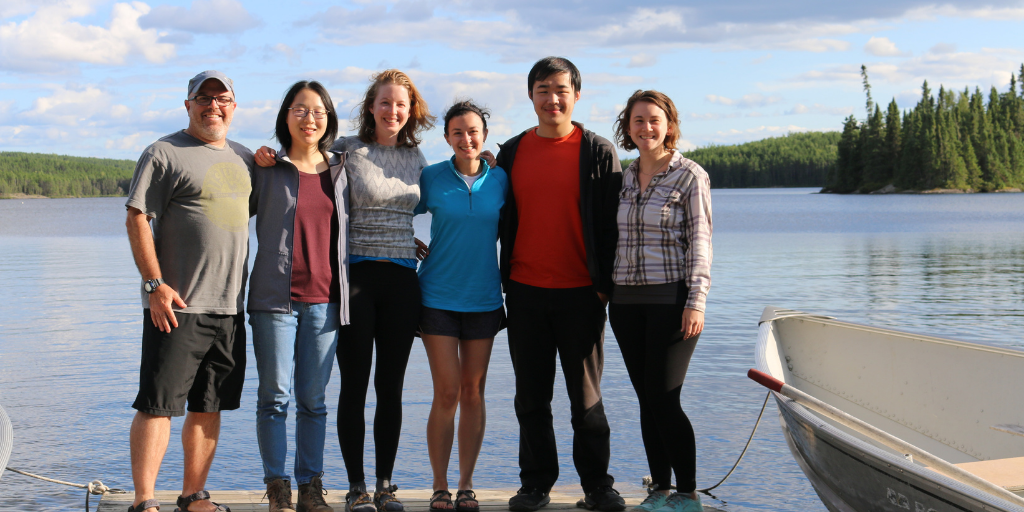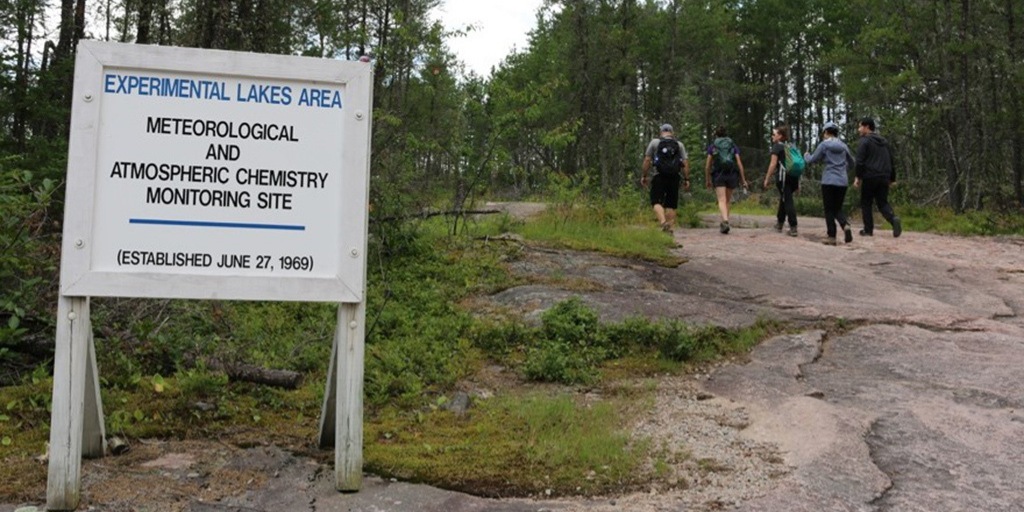Kim Bourne

As a young woman in STEM, I often find it difficult to balance two things: 1) rigidity in order to be taken seriously as an authority in my field; and 2) compassion in order to remain approachable by others.
Degree
Ph.D. in Civil & Environmental EngineeringProject Team
As a graduate student focused on modeling water quality, my work is often solitary. So, when an opportunity arose to collaborate with undergraduates and faculty on a project related to my research interests in water and my personal interests in science outreach and education, I was excited to participate.
It was my role to manage teams of undergraduates on the Data-driven Approaches to Illuminate the Responses of Lakes to Multiple Stressors project team, which began as a Data+ project in Summer 2019 and continued as Bass Connections project in 2019-2020. The overall goal of the project was to create interactive visualizations of data collected by the IISD Experimental Lakes Area (IISD-ELA), a “freshwater laboratory” in northwestern Ontario, Canada, that is made up of 58 lakes and their watersheds.

The IISD-ELA research center is the site of many impactful experiments completed by altering entire watersheds, lakes or smaller contained systems within lakes. Since its creation in 1969, IISD-ELA has maintained records of the chemical and physical properties of a select few undisturbed lakes, which our team set out to explore and communicate through data visualizations and storytelling techniques. (To learn more about our team’s research outputs, check out our submissions to the 2020 Fortin Foundation Bass Connections Virtual Showcase.)
Through this collaborative project experience, I became a better mentor, teacher and researcher. It was my intent upon joining the team to gain skills in syllabus and course design, project management and mentorship. I communicated this to the faculty team leaders when discussing my responsibilities and was able to take on a strong leadership role. The challenges and successes we experienced as a team helped me grow and learn more than I could have ever anticipated.
Here are the five most impactful aspects of my Bass Connections experience.
1) Mentoring students helped me be a better and more organized researcher.
As the team’s project manager, it was my responsibility to help team members organize their research in a way that would be conducive to collaboration and not lead our team into digital chaos and confusion (let’s be honest, we have all been there). To write effective coding and file management guidelines for others, I had to reflect upon my own research process and the ways in which it could be improved.
Throughout the year, I was able to observe ways in which my guidelines fell short and explore how to improve them in collaboration with the entire team. Bass Connections gave me the structure that I needed to refine a skill that always nagged at the edge of my consciousness as something in need of improvement.
2) Mentoring is more of an art than a science.
There are very few career tracks that do not value effective mentorship skills, but finding and making time for formal mentorship experiences in graduate programs can be difficult. Bass Connections gave me that opportunity to develop my mentorship skills in the context of managing a project team related to my own research and interests.
I found that acting as an effective mentor can often be a balancing act. For example, it can be difficult to find structure to guide students through the research process without taking away their opportunity to push past their comfort zone and think independently. At the same time, it can also be tricky to provide a compassionate and supportive environment for students to explore research while still operating in the space of an authority figure charged with ensuring a project moves forward.

Best practices in academic mentorship are well-researched and documented. However, while pedagogical research is helpful in determining practical mentorship strategies, my personal experience on this team was invaluable for learning how to fit my own style of project management into the mentorship framework.
For example, I can often be disorganized and scatterbrained. Because of this, I tend toward a hands-off mentorship style as I subconsciously trust others to be much more organized than myself. With the guidance and support of my faculty team leads (for which I am very grateful!), I learned ways of organizing myself and my thoughts more effectively. This enabled me to be more versatile as a leader and helped me tailor my leadership style to fit the needs of the students.
As a young woman in STEM, I often find it difficult to balance two things: 1) rigidity in order to be taken seriously as an authority in my field; and 2) compassion in order to remain approachable by others. This is true in many settings, but especially when I am in a leadership or management position on a project team.
Bass Connections is many undergraduate students’ first research experience and an opportunity for them to learn the research process in a structured and supportive environment. My personal tendency has been to forgo rigidity in task management in favor of compassion to ensure students were not discouraged by their mistakes. However, my leadership role in Bass Connections gave me the opportunity to practice a better balance between these two aspects of project management and mentorship, which ultimately led to more productive workflow and research outputs.
3) Exploring topics outside of my dissertation and stepping into the role of an educator helped me gain perspective on the direction of my career.
As a graduate student, it can be difficult to explore other areas of research and potential career paths while completing a dissertation. Being part of an interdisciplinary team allowed me to explore research areas tangential to my dissertation including science communication, translating research into environmental policy and lake ecology. As a project manager, I was able to observe and discuss details of every aspect of the research being performed by students. This was a rare and valuable opportunity to have working knowledge of every piece of an interdisciplinary project.

In addition to exploring my goals as a future researcher, I was able to reflect upon my desired balance between the roles of researcher, team manager and educator. I have often felt the pressures of pursuing a successful career in consulting or academia after graduation. Reflecting upon my experience in Bass Connections has given me the opportunity explore questions about what I want out of my future career, such as: What is it that I love about the research process? Is it working with other people? Do I prefer doing the research myself or would I rather guide others as they do the research?
4) The connections I have made with faculty outside of my department during this project have been invaluable.
Through this project, I have formed professional relationships with Duke faculty and community partners that I would not have met otherwise. I have continued to collaborate with and seek advice from the faculty with whom I worked, making them an invaluable part of my graduate education and part of a growing professional network for the present and future.
5) Working with interdisciplinary teams can be frustrating and difficult, but with open communication, patience and close collaboration (often in that order), they can succeed in creating a well-rounded and creative set of outputs.
Our team consisted of students of many different majors and levels of experience. While this was a strength in that the collective knowledge of our group was vast and varied, it also meant a high variation in individual gaps in knowledge. This made it difficult to ensure the whole team was on the same page and to efficiently address knowledge gaps.
Over the course of our project, we worked in the areas of science communication, ecology, bio-geo-chemistry, hydrology, data analysis and coding. Each of the students in our group had differing levels of experience in these areas. While many teams assign tasks based on knowledge and abilities, the creation of our website and project deliverables required each group of students to understand the data, its underlying concepts and how to present these data to K-12 audiences. Students in the same groups often worked at different paces, making collaboration and problem solving as a team difficult.
Despite these challenges, incorporating fresh perspectives on the subject matter often resulted in more creative data visualizations and valuable reflection on the overall presentation of the material on our website. At the end of the year, I have no doubt that our project outputs were all the better because of the academic diversity of our team.

Overall, my Data+ and Bass Connections project teams proved to be invaluable experiences that taught me a lot about myself and how I can improve as an educator and mentor. Additionally, they provided me with the opportunity to expand my professional connections - a development that has enriched my graduate experience at Duke. I would encourage anyone interested in working on unique projects with an interdisciplinary team and/or gaining hands on experience in mentorship to take advantage of this great program here at Duke.
